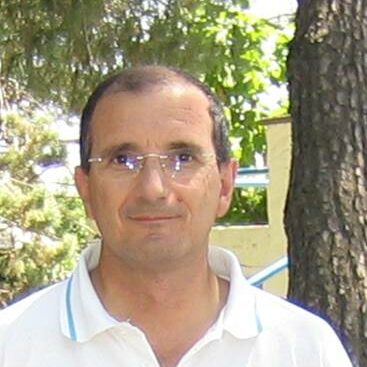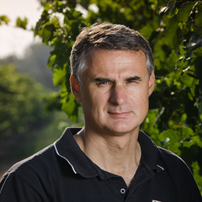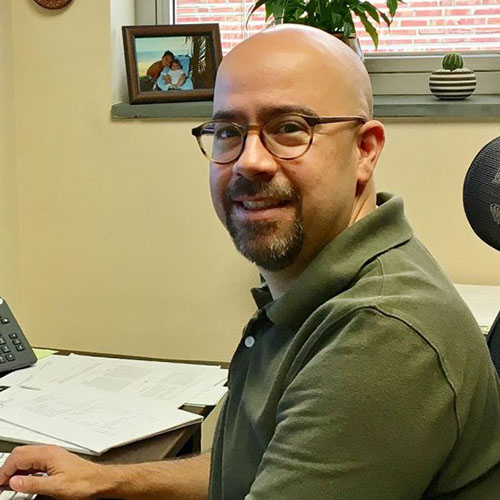AREA
CAA/ Agricultural and Agri-food sciences
SUB AREA
AYF/ Agriculture and forestry : Sustainable systems of plant production and protection
KEYWORDS
WEED ECOLOGY , SUSTAINABLE AGRICULTURE PRACTICES, INTEGRATED CROP PROTECTION, ORGANIC AGRICULTURE, AGROECOLOGY
SUPERVISORY TEAM

PROF. JORDI RECASENS
Supervisor
He obtained the degree (1979) and doctorate (1985) in Biology by the Universitat Autònoma de Barcelona. Since 1982 is professor in the Agronomic School of Universitat de Lleida teaching agricultural botany and weed science in the degree of Agronomy and in the Master of Integrated Crop Protection. Is also member of Agrotecnio Center, a CERCA excellence research center. His scientific specialisation allowed him to create, 25 years ago, the research group of Weed Science and Plant Ecology, recognised since 2005 with the mention of Quality Research. He has been the PI in 12 national and 5 international research projects, the supervisor of 12 PhD and published 65 scientific articles, four books, five international book chapters and more than 70 articles in others scientific journals. He has stablished more than 40 agreements with companies and creates, in 2020, the Chair University-Company on Weed Science. He has been the secretary (1995-2001), president (2007-2010) of the Sociedad Española de Malherbología; vice-president of the Asociación Española de Sanidad Vegetal (20012-2017) and member of the board of the European Weed Research Society (2012-2014). He has been recognised four periods of research and another of transfer.

JOAN ESTEVE JULIÀ
Co-Supervisor
Agronomic engineer by University of Lleida (1989). Master of plant sciences in the Faculty of Plant Sciences in the California State University-Fresno (1989-1992) and Assistant Research in this faculty (1990-1992). For 5 years (1992-1997) he was the commercial Director of the Company Mazorla (Biele Group) –based on the city of Logroño-, company that designs, manufactures, installs and provides maintenance services for wine machinery and industrial hydraulic presses. Between 1997 and 2000 was de Commercial Director for Iberia Peninsula of Hardi International S.A. company specialized on manufacturing agricultural crop protection equipment. In 2000 started as a responsible of viticulture in the Company Raventós Codorniu, achieving in 2018 the position of Director in the Raimat celery. In 2006 coursed the Master of Enology organized by the Institut Català de la Vinya i el Vi, and between 2008 and 2015 collaborated as associated professor in the Foundation Universidad de la Rioja. In 2009, cofounded with other entities, the company Agropixel, a service company dedicated to productive improvement, input optimization and production and quality planning in the agriculture sector. He has also the certificate of Integrated Pest Management (2014) from Department of Agriculture of Generalitat de Catalunya.

DR. RAMÓN LEÓN
Co-Supervisor
Dr. Ramon Leon is an associate professor of Weed Biology and Ecology in the Department of Crop and Soil Sciences, and member of the Center for Environmental Farming Systems and the Genetic Engineering and Society Center of North Carolina State University, USA. Previously, he was an associate professor of Weed Science for row crops and turfgrass systems at the University of Florida, USA; professor of Weed Science (80% teaching 20% research) at EARTH University in Costa Rica, and assistant professor (100% teaching) at California Polytechnic State University, San Luis Obispo, USA. Dr. Leon obtained a Ph.D. (2005) and M.S. in Crop Production and Physiology (2003) with emphases on Weed Science and Seed Science, and a Ph.D. in Genetics (2005) from Iowa State University, and a B.S. in Agronomy (2000) from the University of Costa Rica. His research has focused on understanding changes in weed dynamics in response to agronomic and environmental factors. He has published 97 peer-reviewed articles, 173 abstracts, 45 extension publications, and 3 book chapters. Dr. Leon is an associate editor for Weed Science, Weed Research, Peanut Science, and previously for Weed Technology, and he is currently in the editorial board of Agronomy.
RESEARCH GROUP
DESCRIPTION
The activity of the research group becomes a fundamental pillar of the integrated crop protection (ICP), a scientific specialty with extensive research experience at the University of Lleida (UdL). ICP is determinant in the crop production at European and National level, being regulated by different European Directives and National Regulations. The group from UdL has achieved high specialization in these main topics: a) weed ecology in agroecosystems, b) integrated weed management, especially of herbicide resistant weeds, and c) analysis of the ecosystems services provided by weeds in agricultural systems. These fields of research offer a diversified analysis of weed ecology and control according to the sustainability of crop production. This activity has been possible thanks to numerous international projects (Eranet IPM, Eranet biodiversity, Spanish-German Integrated Action) and national projects (MINECO, Grupos Operativos, RIS3) in the last 10 years. As a result, more than 100 articles JCR have been published.
The Research group consists of two professors, one RyC fellowship, one Beatriu de Pinós fellowship, two postdoc, three PhD, two master students and one technician. The group is leading the research cluster “Malherbología”, which brings together researchers from 3 Campus Iberus universities: University of Lleida, University of Zaragoza and University of La Rioja.
OUTPUTS OF RELEVANCE
Since 2005 the group is recognized with the mention of Quality Research by Catalan Government.
The group accredits 25 years of transfer of knowledge and agreements with public and private institution on weed seedling identification, weed ecology and integrated weed management.
In 2008 the research group has been recognized by Spanish Ministry of Agriculture to carry out official recognized assessments (Ensayos EOR) for chemical companies.
The group keeps a close relationship with chemical companies (Corteva, Bayer, Syngenta, BASF, FMC, SIPCAM, Ascenza) and stablished different agreements (more than 700.000€ in the last 10 years). Additionally, the group has also collaborated in research with numerous international institutions, especially in the last 5 years resulting in over 30 joint publications
In June 2021 it is expected the approval of a UdL-Spin-Off based on a technological platform on decision support system for advice on efficiency use of herbicides.
The research activity has been awarded in 5 congresses of the Sociedad Española de Malherbología and awarded in 2018 with the Best Spanish Scientific Article on Agriculture by Fira de Lleida.
The group has organized in UdL more than 40 training courses for technicians belonging to chemical companies, and other more than 50 courses in different places of Spain and Portugal.
NETWORK OF COLLABORATORS
Raventós – Codorniu
North Carolina State University (USA).
University of Aarhus (Denmark).
Julius Kuehn-Institute in Braunschweig (Germany).
University of Rostock (Germany).
BAGAP-INRA Rennes (France).
Université Paul Valérie Montpellier (France).
Rothamsted Research Station (UK).
North CSCR Laboratory from USDA-ARS (Minnesota – USA).
University of Pennsylvania (USA).
Universidad Nacional del Sur (Bahía Blanca – Argentina).
CAREER DEVELOPMENT
PROPOSED SECONDMENT
A secondment for 5 months is offered at Raventós Codorniu S.A. The company is one of the leaders in the country in issues of sustainability of vineyards production, accrediting a long history in issues of efficiency in the use of resources and optimization of inputs in crop management. The scientific component will be strengthened through the fellow’s integration in the viticulture team of Raimat vineyars (Lleida) as well as with the technicians of the Associació de Defensa Vegetal. The purpose of the secondment is related to: i) innovation, improvement and transfer for technology applied in vineyards in the search of alternative weed control methods b) training on the use of cover crops and mulches as a way to improve the sustainability of crop production and c) propose and stablish a network of collaborative activities inside the new national and EU experimental projects. He/she will collaborate with Agropixel (cofounded by Joan Esteve) to participate in vine vigor monitoring methods through flights and in their interpretation through aerial images. This knowledge should be related to their experience on covers-crops, sustainable agriculture practices, organic agriculture and agroecology.
In addition, a research stay will be possible at the main campus of North Carolina State University, located in Raleigh, NC (USA), where the fellow will be exposed to modern techniques used for studying weed biology and to optimize weed management. These include: machine learning, image analysis, development of forecasting models for optimizing weed management strategies and timing of weed control using the national weather networks. Furthermore, Research Triangle Park is located at less than 30 minutes from campus, where some of the most important Agrobiotech companies have R&D operations, so he/she will have the opportunity to visit them and build collaborative partnerships.
DESIRABLE DEVELOPMENT
Employability
International mobility
Building collaborative networks
Fundraising (grants, projects)
Teaching and supervision.
Promotion of agreements with agricultural companies
TRAINING SKILLS
Project management
Communication skills
Grant writing
Open Science
Ethics
Entrepreneurship and leadership
Specific skills
OTHERS
The postdoctoral researcher will be introduced in the academic activity of the research group and linked to the Co-supervision of PhD, TFM and TFG of different students.
He/she will be included in the staff of invited/associated professors who will teach in advanced topics in weed science, especially in the master’s degree on Integrated Crop Protection. Furthermore, he/she will be involved in the organization of seminars, debates, conferences and transfer courses that the research group annually organizes with social sectors, administration and industries.
The post-doc researcher will be also involved in the new activities of the Chair University –Company on Weed Science that the research group planned to carry out.
According with the research activity developed, the creation of new agreements with external (public and private) entities will be promoted.


